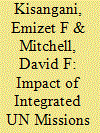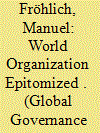|
|
|
Sort Order |
|
|
|
Items / Page
|
|
|
|
|
|
|
| Srl | Item |
| 1 |
ID:
184651


|
|
|
|
|
| Summary/Abstract |
Contemporary peacekeeping operations carry out many disparate tasks, which has triggered a debate about “Christmas Tree mandates.” Did the UN Secretariat or the UN Security Council drive this expansion? Using original data on nineteen UN peacekeeping missions, 1998–2014, this article compares peacekeeping tasks recommended by the Secretariat to those mandated by the Council. It finds that the two bodies expressed different preferences regarding the nature, number, and novelty of peacekeeping tasks. First, the Council dropped Secretariat-recommended tasks as often as it added new ones on its own initiative. Second, the two bodies disagreed more over peacebuilding and peacemaking tasks than over peacekeeping tasks. Third, the Council preferred to be the one to introduce novel tasks that had not appeared in previous mandates. Finally, among the countries that “held the pen” on peacekeeping resolutions, the United States was the most prone to dropping Secretariat-proposed tasks and the least willing to add tasks itself.
|
|
|
|
|
|
|
|
|
|
|
|
|
|
|
|
| 2 |
ID:
184650


|
|
|
|
|
| Summary/Abstract |
Since the end of the Cold War, the UN has extended many of its missions in conflict zones to include political, military, and humanitarian activities. Many humanitarian nongovernmental organizations have been critical of these “integrated” UN missions, claiming that they can blur the distinction between political, military, and humanitarian action, thus placing humanitarian aid workers at risk of retaliation from warring factions opposed to the UN’s political objectives. This proposition is empirically tested using generalized methods of moments statistical analysis of sixty-seven countries that experienced intrastate conflict between 1997 and 2018. When assessing attacks in general—to include the sum of aid workers killed, wounded, and kidnapped—the results indicate that humanitarian aid workers are more likely to come under attack in countries that have an integrated UN mission. However, when the attacks are assessed separately, results show that this relationship holds only with aid workers who are killed in the field.
|
|
|
|
|
|
|
|
|
|
|
|
|
|
|
|
| 3 |
ID:
184653


|
|
|
|
|
| Summary/Abstract |
This article investigates the stark variation in elite appraisals of the performance of the International Criminal Court (ICC). Based on an online survey of diplomats posted to the UN headquarters, this article determines which country situations under ICC scrutiny respondents regard as successes or failures and, in turn, what parameters underpin their views. It also asks about negative cases; that is, country situations that never made it to The Hague due to political considerations. This article makes a two-fold contribution to the study of international law and politics. First, it shows that diplomats conceptualize international justice in terms of ongoing prosecutions and convictions obtained. Thus, they downplay indirect effects such as positive complementarity. Interestingly, scholars and diplomats agree on the court’s fiascos, yet dissent on successes. Finally, diplomats have proved tired of political considerations obstructing international justice. Survey data reveals that they want the court to investigate situations involving major powers.
|
|
|
|
|
|
|
|
|
|
|
|
|
|
|
|
| 4 |
ID:
184649


|
|
|
|
|
| Summary/Abstract |
This article assesses recent UN reforms to enhance the organization’s capacity to prevent violent conflict. These reforms target crucial inefficiencies within the UN that have hampered effective preventive and protection practices in violent conflict and atrocities. The article argues that state actors have viewed the reform process as a site of norm contestation, and negotiations have created an avenue for compromises on the centrality of human rights and political backstopping of UN missions in volatile field contexts that are vital to better prevention and protection outcomes. Contestation by state actors is significant in steering the outcomes of institutional reform as states advance their normative agendas, and seek to integrate these preferences into new institutional structures that are open to negotiation through the reform process. A broad assessment of these reforms confirms the move toward a more pragmatic vision of peace and security in the UN to accommodate global power shifts.
|
|
|
|
|
|
|
|
|
|
|
|
|
|
|
|
| 5 |
ID:
184652


|
|
|
|
|
| Summary/Abstract |
The International Organization for Migration (IOM) became a related organization in the United Nations system in 2016, and has rebranded itself as the “UN Migration Agency.” This article examines the drivers and significance of IOM’s new relationship with the UN. It traces the evolution of the IOM-UN relationship, and the processes that led to IOM becoming a related organization. While some contend that IOM is still not really part of the UN system, through an analysis of the status and political positioning of related organizations this article demonstrates that, as a related organization, IOM is indeed now part of the UN system. It argues that IOM’s work with forced migrants in the humanitarian sector played a pivotal role in enabling this shift, and considers its implications.
|
|
|
|
|
|
|
|
|
|
|
|
|
|
|
|
| 6 |
ID:
184654


|
|
|
|
|
| Summary/Abstract |
This article examines levels and patterns of legitimacy beliefs toward one of today’s most developed global multistakeholder regimes, the Internet Corporation for Assigned Names and Numbers (ICANN). Two complementary surveys find that levels of legitimacy perceptions toward ICANN often rank alongside, and sometimes ahead of, those for other sites of global governance, both multilateral and multistakeholder. Moreover, average legitimacy beliefs toward ICANN hold consistently across stakeholder sectors, geographical regions, and social groups. However, legitimacy beliefs decline as one moves away from the core of the regime, and many elites remain unaware of ICANN. Furthermore, many participants in Internet governance express only moderate (and sometimes low) confidence in ICANN. To this extent, the regime’s legitimacy is more fragile. Extrapolation from mixed evidence around ICANN suggests that, while multistakeholder global governance is not under existential threat, its legitimacy remains somewhat tenuous.
|
|
|
|
|
|
|
|
|
|
|
|
|
|
|
|
| 7 |
ID:
184648


|
|
|
|
|
| Summary/Abstract |
Brian Urquhart was the second person to enter the international civil service of the United Nations. He witnessed the creation of the world organization at close range, played an important part in the invention of what later on would be labeled the “Blue Helmets,” worked closely with the first five Secretaries-General and rose to under-secretary-general himself. Even after his retirement in 1986, he remained a source of counsel and advice for those engaged in the efforts to organize an ever changing and difficult world. His death at the age of 101 marks the passing of the “first generation”
|
|
|
|
|
|
|
|
|
|
|
|
|
|
|
|
|
|
|
|
|